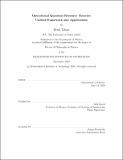| dc.contributor.advisor | Lloyd, Seth | |
| dc.contributor.author | Takagi, Ryuji (Physicist) | en_US |
| dc.contributor.other | Massachusetts Institute of Technology. Department of Physics. | en_US |
| dc.date.accessioned | 2022-10-17T20:00:14Z | |
| dc.date.available | 2022-10-17T20:00:14Z | |
| dc.date.copyright | 2020 | en_US |
| dc.date.issued | 2020 | en_US |
| dc.identifier.uri | https://hdl.handle.net/1721.1/145865 | |
| dc.description | Thesis: Ph. D., Massachusetts Institute of Technology, Department of Physics, September, 2020 | en_US |
| dc.description | Cataloged from student-submitted PDF version of thesis. | en_US |
| dc.description | Includes bibliographical references (pages 209-229). | en_US |
| dc.description.abstract | A major goal of quantum information science is to understand the relation between the properties of quantum features and the enhancements to information processing tasks enabled by them. In particular, precise quantitative descriptions of quantum phenomena have become increasingly important not only for theoretical interest but also from a practical point of view as the recent technological advances have provided access to systems on small scales, in which quantum effects play major roles. As a platform to offer such quantitative treatments, quantum resource theory has been developed. This is an operationally motivated framework, which systematically deals with quantication and manipulation of the quantum effects by considering the quantities of interest as precious "resources" that cannot be freely created by the given sets of operations. | en_US |
| dc.description.abstract | This thesis develops quantum resource theories from two perspectives. The first part advances the framework of general resource theories, which encompass various types of quantum phenomena such as quantum entanglement, quantum superposition, and many others. We find that common structures universally shared by a wide class of resources can be extracted by employing operational viewpoints. Specically, we consider fundamental operational tasks in quantum information theory -- state/channel discrimination, resource distillation/dilution, implementation of unitary evolution -- and establish quantitative connections between the resource contents and their operational capabilities. Our general results contribute to building a unified picture of quantum resources, allowing us to gain a deeper understanding of the characterization of quantum mechanics. The second half of the thesis applies the resource theory to specic settings such as continuous-variable systems, systems with conserved additive quantities, and communication via quantum channels. We show that operational perspectives offered by resource theories provide effective ways of quantifying the underlying resources and concise arguments to solve concrete problems of interest, suggesting the further potential of resource theory as a useful theoretical tool. The resource objects considered in this thesis span from quantum states to quantum measurements and channels, extending the consideration beyond static resource theories that have been a major focus in the field, and paving the way for the development of dynamic resource theories. | en_US |
| dc.description.statementofresponsibility | by Ryuji Takagi. | en_US |
| dc.format.extent | 229 pages | en_US |
| dc.language.iso | eng | en_US |
| dc.publisher | Massachusetts Institute of Technology | en_US |
| dc.rights | MIT theses may be protected by copyright. Please reuse MIT thesis content according to the MIT Libraries Permissions Policy, which is available through the URL provided. | en_US |
| dc.rights.uri | http://dspace.mit.edu/handle/1721.1/7582 | en_US |
| dc.subject | Physics. | en_US |
| dc.title | Operational quantum resource theories : unified framework and applications | en_US |
| dc.type | Thesis | en_US |
| dc.description.degree | Ph. D. | en_US |
| dc.contributor.department | Massachusetts Institute of Technology. Department of Physics | en_US |
| dc.identifier.oclc | 1347211056 | en_US |
| dc.description.collection | Ph. D. Massachusetts Institute of Technology, Department of Physics | en_US |
| dspace.imported | 2022-10-17T20:00:14Z | en_US |
| mit.thesis.degree | Doctoral | en_US |
